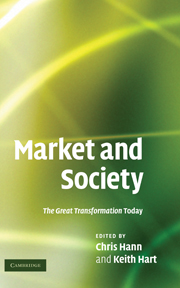Book contents
- Frontmatter
- Contents
- List of figures and table
- List of contributors
- 1 Introduction: Learning from Polanyi 1
- 2 Necessity or contingency: Mutuality and market
- 3 The great transformation of embeddedness: Karl Polanyi and the new economic sociology
- 4 The critique of the economic point of view: Karl Polanyi and the Durkheimians
- 5 Toward an alternative economy: Reconsidering the market, money, and value
- 6 Money in the making of world society
- 7 Debt, violence, and impersonal markets: Polanyian meditations
- 8 Whatever happened to householding?
- 9 Contesting The Great Transformation: Work in comparative perspective
- 10 “Sociological Marxism” in central India: Polanyi, Gramsci, and the case of the unions
- 11 Composites, fictions, and risk: toward an ethnography of price
- 12 Illusions of freedom: Polanyi and the third sector
- 13 Market and economy in environmental conservation in Jamaica
- 14 Embedded socialism? Land, labor, and money in eastern Xinjiang
- 15 Afterword: Learning from Polanyi 2
- Bibliography
- Index
14 - Embedded socialism? Land, labor, and money in eastern Xinjiang
Published online by Cambridge University Press: 08 August 2009
- Frontmatter
- Contents
- List of figures and table
- List of contributors
- 1 Introduction: Learning from Polanyi 1
- 2 Necessity or contingency: Mutuality and market
- 3 The great transformation of embeddedness: Karl Polanyi and the new economic sociology
- 4 The critique of the economic point of view: Karl Polanyi and the Durkheimians
- 5 Toward an alternative economy: Reconsidering the market, money, and value
- 6 Money in the making of world society
- 7 Debt, violence, and impersonal markets: Polanyian meditations
- 8 Whatever happened to householding?
- 9 Contesting The Great Transformation: Work in comparative perspective
- 10 “Sociological Marxism” in central India: Polanyi, Gramsci, and the case of the unions
- 11 Composites, fictions, and risk: toward an ethnography of price
- 12 Illusions of freedom: Polanyi and the third sector
- 13 Market and economy in environmental conservation in Jamaica
- 14 Embedded socialism? Land, labor, and money in eastern Xinjiang
- 15 Afterword: Learning from Polanyi 2
- Bibliography
- Index
Summary
Introduction
“Nineteenth century civilization has collapsed,” declares Karl Polanyi in the opening sentence of The Great Transformation. His ensuing analysis focuses on the emergence of the self-regulating market as a world-historical aberration, contrasting both with the great agrarian empires and with the non-literate societies studied by anthropologists. Yet the work remains full of ambiguity: did Polanyi mean the “self-regulating” as a realistic descriptor or did he mean the idea of such a market? It is in any case a very Eurocentric narrative. It is concerned in particular with Britain, where Polanyi conceived his study of “the political and economic origins of our time” in the late 1930s.
“Our time” today is quite different. It is tempting now to proclaim the collapse of twentieth-century civilization, but this collapse demands a more complex explanation than the Polanyi prototype. Such an account would need to address, first, the attrition of that “embedded liberalism” (Harvey 2005a, following Ruggie 1982) which came to characterize the advanced capitalist countries in the decades after Polanyi's dramatic indictment of pre-welfare state “disembedding.” As Keith Hart and I point out in our Introduction to this volume, this metaphor has been a continuous source of confusion. I distinguish here between general moral embedding and political embedding. Polanyi shows in his magnum opus that the conditions for the catastrophic existential moral and social disruption of human communities in industrial communities were the work of the capitalist state.
- Type
- Chapter
- Information
- Market and SocietyThe Great Transformation Today, pp. 256 - 271Publisher: Cambridge University PressPrint publication year: 2009
- 15
- Cited by

